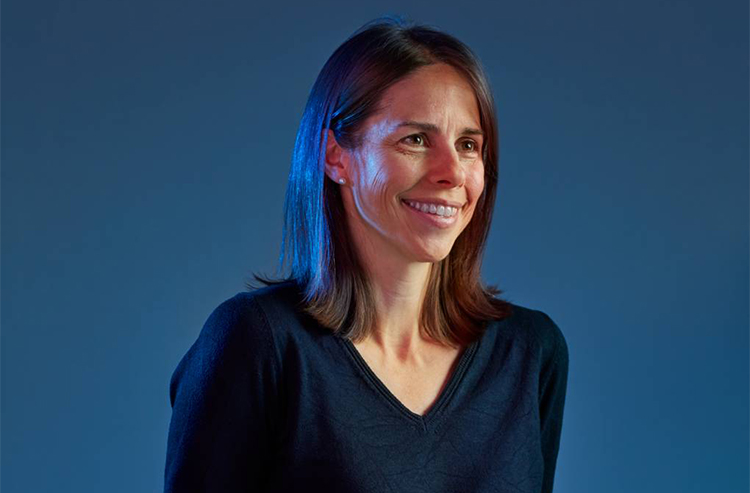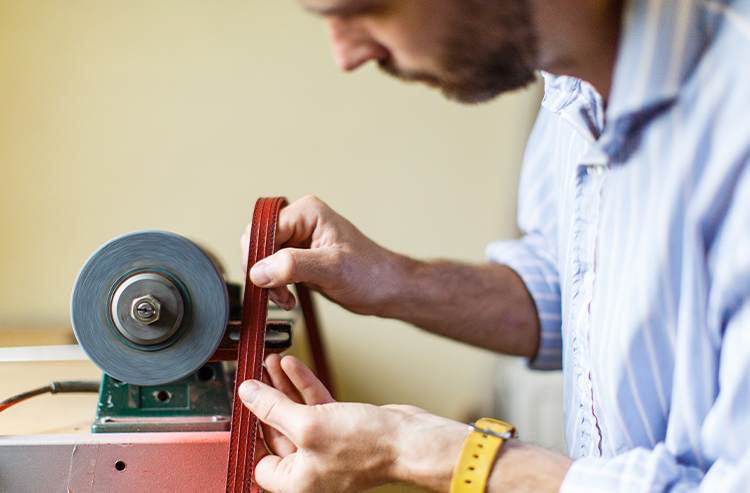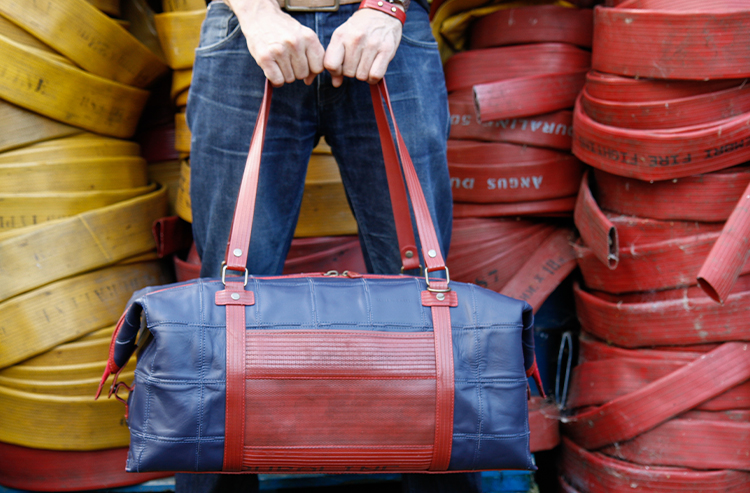Kresse Wesling, CBE, is a Kent based multi-award-winning environmental entrepreneur and is appearing as a keynote speaker at our upcoming Kent Business Summit. After first meeting the London Fire Brigade in 2005, Kresse launched Elvis & Kresse, which rescues and transforms decommissioned firehose into innovative lifestyle products and returns 50% of profits to the Fire Fighters Charity. Kresse and partner Elvis has worked directly with Kent Business School to deliver workshops that feed into the thread of sustainable innovation that underpins the teachings of the courses we offer.
We caught up with Kresse to understand the decisions and motives that influenced the launch of her business and for insight into how students and businesspeople can play their part in giving back to the natural world.
“One of the best ways to access a society is to look at the waste it produces. My great grandparent’s generation in Canada, where I am from, didn’t produce any real waste. They didn’t have bins, they had outhouses for their sewage, it was just a completely different relationship with the natural world. But, in 2004 when I embarked on a journey to uncover the truth about Britain’s waste, you couldn’t Google waste stats. Researching at The British Library I uncovered the horrifying fact that 100 million tonnes of waste was going to landfill that year. There was no way a single person could fix that, but it sparked ideas between my partner Elvis, and myself, we needed to do more to help.
I had been to lots of landfill sites and had lists of wastes that were particularly pernicious and shouldn’t be there. A chance meeting with the London Fire Brigade gave me a problem that was within reach to solve. They had 3 tonnes of firehose that go to landfill in a good year, because they are reaching the end of their health and safety life. In a bad year they can have up to 10 tonnes. I couldn’t solve 100 million tonnes of rubbish a year, but perhaps we could find a use for firehose.
I went back to the British library to learn everything I could about firehose. We investigated its constituent components – things like melting points and where else this material might be used. I discovered French luxury fashion houses had been using the same complex polymer materials in a lot of products since the 1960s. I just thought: ‘Why are they creating a new synthetic material when all this is being discarded every year?’ The idea of firehose luxury goods was born. Elvis was to design (with no background in fashion or art, he used his sheer determination to do so) and I was to run the business.
That said, I didn’t see Elvis & Kresse as a business, but as a solution. The capacity to do good was paramount and much more important than trying to mitigate harm. We talk about our rights as humans but so seldom our obligations and that’s the dialogue I think really needs to change. Our cultivation of a solution for the firehose issue became an effective and beautiful design of belts, bags, and other accessories but our model was much more than that. We wanted to challenge the way we manufactured, where we manufactured these goods and what we did with the profits – donating 50 per cent back to charity, using renewable energy and making all our packaging from other rescued materials.
We started with a single belt and turnover of just £8,000 in the first year but now produce tens of thousands of products a year, employing 25 staff. Elvis & Kresse have as little as a four per cent returns rate because our customers love our products, what we do and also the services we offer and the respect we give them. To Elvis and I our customers are our partners, they are like solid gold. Even lockdown didn’t hold us back, thanks to our local approach to production, we were able to keep making products by re-choreographing our production and even moving some sewing machines to the homes of our employees.
Aside from the good work we do, our business brings us so much joy. We’ve laser-etched products with ‘Will You Marry Me’ and participated in a lot of weddings, retirement gifts and some amazing bespoke products made for people who have ties to the Fire Brigade – for instance, a man who brought back a hose their grandfather had used years ago and asked for something to be made from it.
People are always dumbfounded by the business and how we launched it, but it’s not rocket science. To start a business for good, that can really make a tangible difference to climate change, you simply must find a solution to a problem. Start with the problem not the product. Ask yourselves: ‘What large, global problem is there that I think I can help to solve?’ There are so many of them, you won’t be stuck for ideas. With a problem, it’s harder to walk away and you will feel the power of solving it. Use that power to create something exciting and beautiful.”
‘In 2021 to stand out, engage with the big problems’
Here, Kresse offers her starting points to launch a business that really tackles the issues that matter.
- Solve an actual, crisis level problem. Most entrepreneurs consider themselves to be problem solvers. They roll-out ideas that make life easier, more entertaining, healthier, or safer. But in 2021, to really stand out you must engage with the big problems and if you need inspiration, the UN Sustainable Development Goals (SDGs) are a good place to start.
- Focus on Multiple Positive Objectives. You also must remember that you can’t solve a big problem sustainably if your solution causes other problems. We serve on the board of charities, are a certified Social Enterprise, make our packaging from reclaimed materials, offer local employment to our workers, scholarships for those wanting to learn the trade and donate profits to good causes to mention a few things. We also strive to always do better.
- Love your Problem. By remaining wedded to firehose, we never fail to have impact. By being experts in our waste materials we can adapt our business over time while continuing to solve our chosen problems and deliver real change.
- Be genuine. Remember that a brand is meant to stand for something, so stand for something and then deliver. A brand isn’t a stunning logo or a catchy strapline. It is the recognisable manifestation of a team, their activities and the goods or services they provide.
Kresse will be speaking at the annual Kent Business Summit, which will bring together Kent business leaders, local government decision-makers and academic experts to discuss regional challenges and promote Kent as a sustainable, innovative, forward-thinking and outward-looking county.
To book your place at the Summit, click here or go to www.kent.ac.uk/KBS and click on events.



